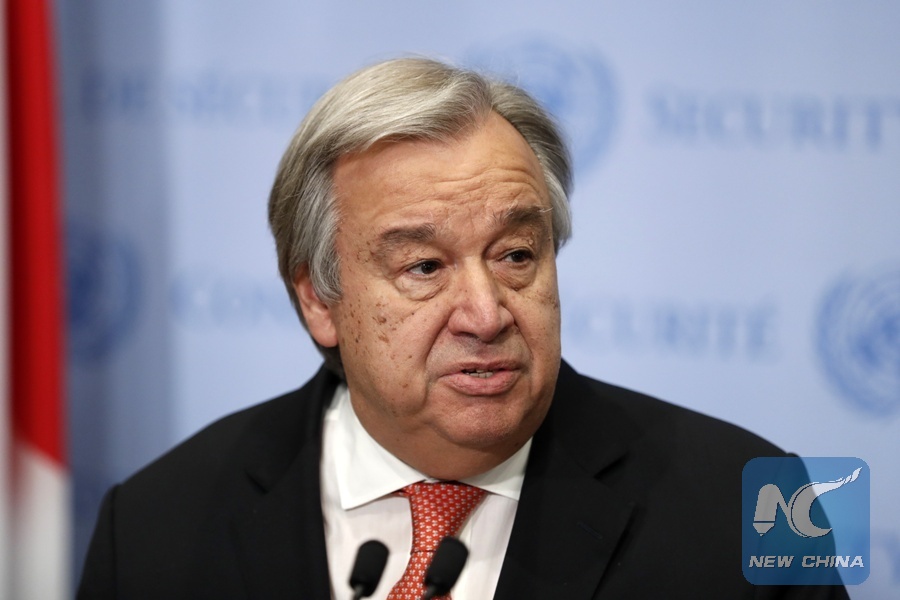
UN Secretary-General Antonio Guterres reads a statement at the UN headquarters in New York, on Dec. 6, 2017. (Xinhua/Li Muzi)
UNITED NATIONS, Jan. 18 (Xinhua) -- UN Secretary-General Antonio Guterres on Thursday warned that threats posed by weapons of mass destruction seem to be gathering force in today's world.
Global anxieties about nuclear weapons are at the highest level since the end of the Cold War; trust on nuclear and other issues between the United States and Russia continues to ebb; the Iran nuclear deal is being questioned; the use of chemical weapons in Syria seriously challenges the global taboo against these weapons of mass destruction, Guterres told a high-level debate at the Security Council on weapons of mass destruction.
"The situation on the Korean Peninsula is the most tense and dangerous peace and security challenge in the world today. I remain deeply concerned over the growing risk of military confrontation and the unimaginable consequences that would result," said Guterres.
He also welcomed the reopening of inter-Korean communication channels, especially military-to-military. "This is critical to lower the risk of miscalculation or misunderstanding and to reduce tensions."
The UN chief said the Democratic People's Republic of Korea (DPRK)'s decision to participate in the upcoming Winter Olympics in South Korea was a good sign.
"We need to build on these small signs of hope, and expand diplomatic efforts to achieve the peaceful de-nuclearization of the Korean Peninsula in the context of regional security."
On the lack of trust between the two major military powers in the world -- the United States and Russia, he warned that vital strategic arms reduction measures established during and after the Cold War are under threat.
On Syria, he said if the use of chemical weapons in the country is once again determined, the international community needs to find an appropriate way to identify those responsible and hold them to account. "Without such an avenue, we are allowing the use of chemical weapons to take place with impunity."
He expressed the hope that the Security Council can return to unity on this issue, referring to Russia's veto of the extension of the mandate for a joint investigative mechanism of the Organisation for the Prohibition of Chemical Weapons and the United Nations on the use of chemical weapons in Syria, leading to the disintegration of the mechanism.
In the case of the Biological Weapons Convention, which does not have a formal verification mechanism, a system of confidence-building measures has contributed to enhancing transparency, said Guterres.
These measures are intended to "prevent or reduce the occurrence of ambiguities, doubts and suspicions" through the provision of annual information on national bio-defense programs, high containment laboratories, legislative frameworks and vaccine production. Unfortunately, participation has been less than satisfactory, with fewer than half of the state parties regularly providing information, he said.
The threats posed by weapons of mass destruction and their means of delivery are taking place in an environment of increasing military budgets and the over-accumulation of weapons. And they are coupled with a serious growth in regional tensions, the UN chief pointed out.
"In such a geopolitical context, confidence-building measures that support arms control, non-proliferation and the elimination of weapons of mass destruction are extremely important."

